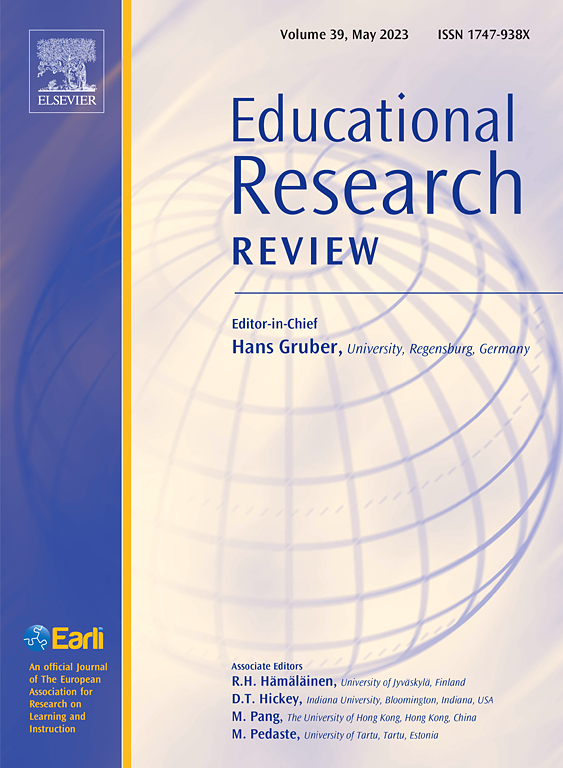Conceptualization, measurement, predictors, outcomes, and interventions in digital parenting research: A comprehensive umbrella review
IF 10.6
1区 教育学
Q1 EDUCATION & EDUCATIONAL RESEARCH
引用次数: 0
Abstract
Digital parenting is being enacted in a rapidly digitalized context and it impacts different children's outcomes. The present study employs an umbrella review involving 31 reviews to derive insights on different aspects of relationships between digital parenting and child development. Results showed that digital parenting had been conceptualized as comprising three dimensions (parental mediation, parents' use of digital technologies, and parents' role-modeling the use of digital technologies) that encompassed what parents did at home and for supporting their children's school learning. Parents and children's media-related variables (e.g., attitudes, technological access and skills) predicted the enactment of digital parenting. Digital parenting was inextricably related to general parenting in that it extended general parenting in the digital environment and it facilitated general parenting. Research was characterized by the use of cross-sectional designs, examination of either a single or multiple aspects of digital parenting, the use of parent or child self-reported perceptions, and the application of exploratory factor analytical approaches. Digital parenting impacted children's online behaviors, exposure to online risks, psychological and emotional wellbeing, digital literacy, and privacy protection. The present study contributes to the scholarship by providing a comprehensive conceptualization of digital parenting, underscoring the protective and promotive functions of digital parenting in child development, and highlighting the need for methodological enhancements in the measurement of digital parenting. It also identifies areas in digital parenting research where the evidence has been mixed or inadequate and therefore, points the way forward for future research.
数字养育研究中的概念化、测量、预测因素、结果和干预措施:全面综述
数字养育是在快速数字化的背景下实施的,并对儿童的不同结果产生影响。本研究通过对 31 篇综述的梳理,对数字化养育与儿童发展之间关系的不同方面进行了深入分析。研究结果表明,数字养育的概念包括三个方面(父母的调解、父母对数字技术的使用以及父母在使用数字技术方面的榜样作用),涵盖了父母在家中以及在支持子女学校学习方面所做的工作。父母和子女的媒体相关变量(如态度、技术使用和技能)预测了数字养育的实施情况。数字养育与一般养育有着千丝万缕的联系,它将一般养育扩展到数字环境中,并促进了一般养育。研究的特点是采用横断面设计,考察数字养育的单一或多个方面,使用家长或儿童自我报告的看法,以及应用探索性因素分析方法。数字养育对儿童的在线行为、在线风险暴露、心理和情感健康、数字素养和隐私保护都有影响。本研究提供了数字养育的全面概念,强调了数字养育在儿童发展中的保护和促进功能,并强调了在测量数字养育方面改进方法的必要性,从而为学术研究做出了贡献。它还确定了数字养育研究中证据混杂或不足的领域,从而为今后的研究指明了方向。
本文章由计算机程序翻译,如有差异,请以英文原文为准。
求助全文
约1分钟内获得全文
求助全文
来源期刊

Educational Research Review
EDUCATION & EDUCATIONAL RESEARCH-
CiteScore
19.40
自引率
0.90%
发文量
53
审稿时长
57 days
期刊介绍:
Educational Research Review is an international journal catering to researchers and diverse agencies keen on reviewing studies and theoretical papers in education at any level. The journal welcomes high-quality articles that address educational research problems through a review approach, encompassing thematic or methodological reviews and meta-analyses. With an inclusive scope, the journal does not limit itself to any specific age range and invites articles across various settings where learning and education take place, such as schools, corporate training, and both formal and informal educational environments.
 求助内容:
求助内容: 应助结果提醒方式:
应助结果提醒方式:


